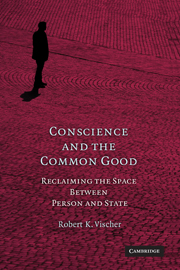5 - Voluntary Associations
Published online by Cambridge University Press: 05 June 2012
Summary
It is no accident that America's political commitment to freedom of conscience has coincided with an equally distinctive sociological commitment to voluntary associations. Nearly 170 years ago, Alexis de Tocqueville famously declared, “in no country in the world has the principle of association been more successfully used…than in America.” However, just as the law tends to force conscience into an individualist framework, the law often fails to recognize associations as anything more than an assembly of individuals. We tend to formulate legal interests, rights, and obligations in terms that are easily classified between the individual on one side and the state on the other. Even though associations defy either category, we try to force disputes involving associations into a close approximation of this bipolar framework. As our legal system wrestles, for example, with the Salvation Army's implementation of faith-driven hiring practices, the Boy Scouts' exclusion of openly gay scoutmasters, or Catholic Charities' refusal to allow same-sex couples into the pool of prospective adoptive parents, observers gravitate toward one of two perspectives. Generally, those who favor the association's side in a particular controversy frame the dispute as one pitting the freedom-loving association against the oppressive state. By contrast, those who oppose the association frame the dispute as one pitting the equality-seeking individual against the oppressive association. Both characterizations have elements of truth, but they give rise to an unnaturally and unhelpfully segmented view of associations.
- Type
- Chapter
- Information
- Conscience and the Common GoodReclaiming the Space Between Person and State, pp. 125 - 154Publisher: Cambridge University PressPrint publication year: 2009



